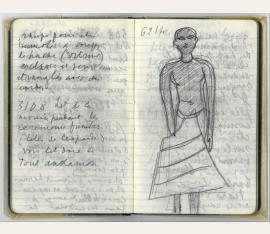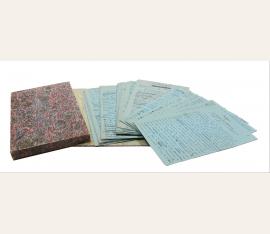French writer (1886-1958). Autograph notebook signed. No place. 12mo. (81), 44 blank, (1) pp. In pencil and ink. With 14 drawings and sketches. Contemporary black calf. In dustjacket. All edges gilt. Endpapers marbled.
4.500 €
(80925/BN52851)
Intriguing pocket-size notebook used by Carco during his trip to Egypt in 1932, in the context of a report on drugs and narcotics, when he visited Alexandria and Cairo and met his second wife, Eliane Négrin. Filled with notes taken on the spot, as well as stories, mainly in pencil, it was used in the novel "Palace Égypte" (Albin Michel, 1933), and in the writing of the "Heures d'Égypte" (Avignon, 1940), a title Carco later set at the head of the first page in blue ink. The drawings and pencil sketches include a bust of Ramses, the head of King Tarraco, a slave, a throne, and goldsmith's work.
Outlining his time in Egypt, Carco mentions Abbot Drioton, curator of the Cairo museum, describes his impressions of the Arabs, the conduct of the veiled women in the gardens of the Ezbekieh and in the street, as well as a conversation with an archaeologist, and provides atmospheric descriptions of landmarks, including Major Gayer-Anderson's house, and his first glimpse of the pyramids from his boat on the Nile, creating a mood of "soft harmony": "Pyramides fond d'or sur le sable rose puis orangées, safran renvoyant la lumière tout est hâlé, d'une harmonie altérée de douceur [...]". Some entries also speak of his dire financial situation and his excessive lifestyle: "My old man, my dear, I've got the money at Deauville, in a suitcase. Every day I take a bundle. Not good for money. The gulf is very good: the little hotel Normandie [...] Domestics. Always hunting and wysky. At home, radio, fridge and wysky. I don't talk to poor people. No good! Too much misery, always shopping. I hate to buy a hundred hats for two years and she refuses. Impossible to understand [...] More money, eh? Broke is ugly. OK I don't have the money. 'Drunk wallet, come here' [...]". - Includes quotations from Nerval, Baudelaire, Du Camp and others, as well as a list of writers, journalists, critics, etc. at the end, probably for the press service of "Heures d'Égypte". - A unique survival in excellent condition..
French writer (1886-1958). Autograph manuscript signed. No place or date. Small 4to. 25, 20, 14, 19, (5) ff. Loosely inserted within a cover of contemporary marbled boards with giltstamped calf label to spine. In marbled slipcase.
6.500 €
(80926/BN52852)
Appealing collection of drafts for Carco's popular "Heures d'Égypte" (Avignon, 1940), dedicated to his impressions of Egypt and his travel memoirs. They comprise three chapters of the "Heures", beginning with "L'Égypte est une présence", including a brief description of the multi-storey palace of the French Egyptologist Auguste Mariette-Pacha, omitted from the published version, praising its bridges, boats, and sails, which are said to be of a blinding whiteness in sharp contrast with the ocean's blue: "Son chateau de plusieurs étages, ses ponts, ses embarcations, ses prélarts d'une blancheur éblouissante contrastaient avec l'azur fonci des flots bleus [...]".
- Accompanying these are two drafts entitled "Sortilèges", renamed "Une histoire de Momie" in the print edition, as well as one of the chapter "Promenade au Mouski", the latter discussing the French writer Gérard de Nerval and his stay in Egypt: "Nerval must have wandered under these signs [...] until 1906, control registers were not required by the Egyptian police and the only information about Gérard's travels is contained in Gautier's [i. e. the French poet and Nerval's travel companion Théophile Gautier] lovely book - full of love, money and light - which the poet left behind during his sojourn in the country. Nerval had been planning to leave for years since the dark winter night of 1841 when, responding to a friend he thought strange, he exclaimed that he was not going home, but was heading East" (transl.). - With numerous erasures and corrections in ink as well as in blue and red crayon. Extremities lightly bumped. A very well preserved set..

